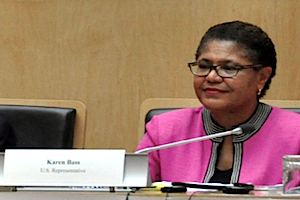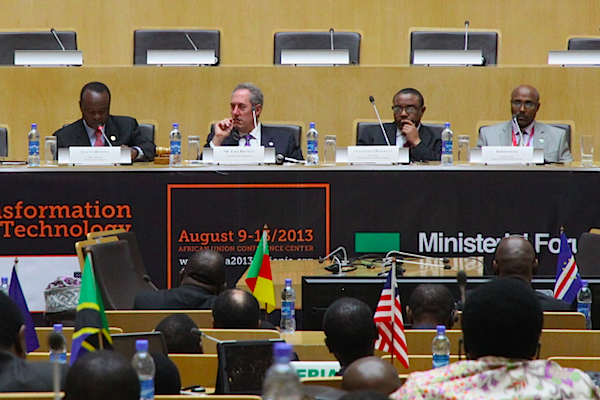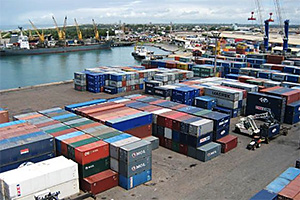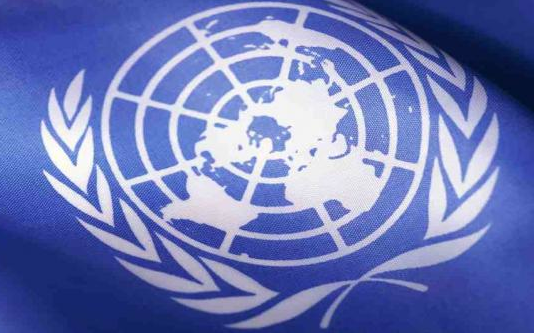USTR Mike Froman encourages US-Africa economic expansion
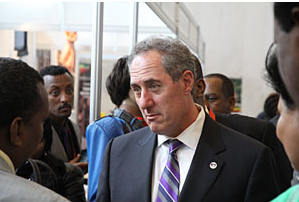
Aggregated Bilateral Trade between AGOA Countries and the United States
Unit: $ million (rounded), YTD Data to MAY 2013 Current and past AGOA beneficiary countries
Business and government representatives from the United States and sub-Saharan Africa should work to expand their economies together, learning from their successes and from other trading partners, says US Trade Representative Michael Froman.
Speaking on the first day of the two-day forum on the African Growth and Opportunity Act (AGOA) in Addis Ababa, Ethiopia, Froman said forum representatives need to prepare for a new AGOA after the current law expires September 30, 2015. Representatives at the meeting include leaders from academia and civic groups.
Froman said discussions about renewing AGOA should begin with a review of where AGOA exports go and why, which noncommodity exports have the greatest trade potential and which exports can be part of global value chains. “What can be done to increase and diversify AGOA utilization?” he asked.
He also said African representatives should find out if every country eligible for AGOA trade preferences has an active export strategy and if every country is working within its regional economic community to realize a free-trade vision. The U.S. president may designate a sub-Saharan African country as AGOA-eligible if it is making progress in such areas as establishing a market economy, developing political pluralism and the rule of law, eliminating corruption and implementing polices to reduce poverty and uphold human and labor rights.
Froman said that as part of the AGOA review, the United States also should look at how it can better leverage technical assistance, restructure regional trade hubs in Africa and coordinate better with Africa’s other bilateral trade partners.
Together, the United States and African countries should “drill down into the thousands of duty-free tariff lines under AGOA” and ask which AGOA countries should qualify to export certain products, Froman said. They should ask if there should be a graduated system for sectors or for countries, and how globally competitive African sectors should be treated compared to new sectors.
Froman said the United States wants forum representatives to share their thoughts on such trade topics as country-of-origin and science-based regulatory measures. The United States also seeks comments about the high cost of getting goods to market in sub-Saharan Africa and about what can be done to improve regional trade through trade facilitation, customs harmonization, infrastructure development and other measures.
Froman said African countries can learn about development successes and about getting new trade and investment partners from countries in Asia, Latin American and Europe.
He said the United States and AGOA members need to look at how they can strengthen multilateral priorities “that will benefit developing countries even more than developed ones and that can help build momentum for further multilateral trade liberalization.”
Calling on forum representatives to look at AGOA as a “stepladder to Africa’s further growth, development and global economic integration,” Froman said they can learn about how Africa can fit into global production and value chains and how they can avoid common pitfalls like rigid localization requirements that act as trade barriers and hinder the development of industries.
Froman said that in coming months, the U.S. secretaries of commerce, energy and treasury expect to travel to Africa to discuss deepening U.S.-African economic ties. In addition, he said, AGOA’s future will be further discussed when President Obama hosts a meeting of African leaders in 2014 in Washington.
AGOA TRADE GROWTH
Since 2001, U.S. trade with sub-Saharan Africa has grown more than 250 percent to more than $72 billion in imports and exports in 2012. While petroleum products still account for the largest portion of U.S. imports, in 2012 non-oil trade totaled $4.8 billion, three times the amount in 2001. Those imports include vehicles and parts; fruits, nuts and seafood; and value-added products like apparel.
The African exports have generated “hundreds of thousands of new jobs that have helped African men and especially women to support their families in ways that once seemed impossible,” Froman said.
“Countless African workers whose jobs depend on AGOA are now able to purchase goods and services that were previously beyond their means,” he said.
“Without a doubt, AGOA has truly transformed the way the United States and Africa interact on trade and economic issues,” Froman said.



